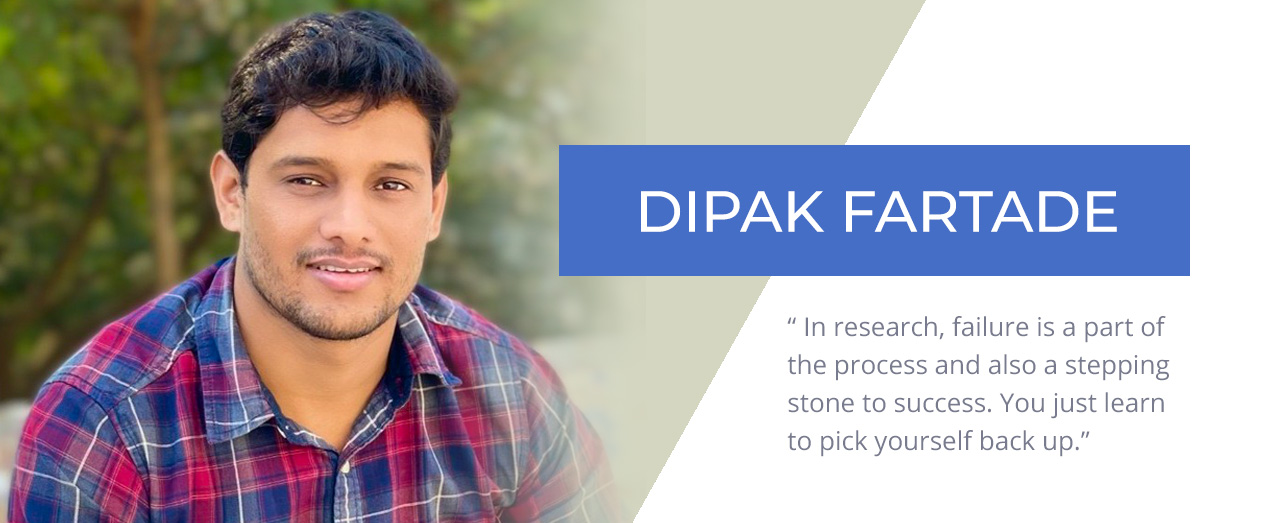
Dipak, a graduate in Chemistry, is a final year PhD student at the Indian Institute of Technology Bombay working under the supervision of Prof. Santosh J. Gharpure. His research focuses on Lewis acid/base mediated cascade alkyne difunctionalization for heterocycle synthesis
Discovering the researcher withinSome minds are just passionately curious and for such people, getting into a PhD program happens organically. What is your story? What made you believe that PhD is your thing?
I have always had that inclination towards chemistry since my school days. During my masters, I had an opportunity to work on a project with Prof. Baskar R. Sathe. This was the time while working with him that made me realise that PhD is my thing and that I should go for it. Meanwhile, I also had an opportunity to attend seminars in the “Science Academies Lecture Workshop”. These encounters made me realise the importance of science and its potential to solve many of the pressing issues that we face today. I decided to join IIT Bombay for PhD and that’s how my research journey kickstarted.
The Big PictureWhat challenges are driving your research within that larger question? Why does this study matter?
Heterocycles are an integral part of most organic compounds, including natural products, bioactive molecules, and pharmaceuticals. They are common in biology, play a crucial role in the metabolism of all living things, and are employed particularly in biochemical processes necessary to sustain life. Alkyne has been presented as one of the most effective and prominent building blocks for the construction of numerous functionalized molecules due to its unique features like nucleophilic as well as electrophilic nature. Alkyne could be selectively activated by π-acidic transition metals, which are used in many cascade processes. The activation of alkyne with Lewis acids and bases is not much explored to date.
My project aims to develop various methods for the synthesis of numerous heterocycles or bioactive molecules via metal-free/Lewis acid/base-mediated cascade difunctionalization of alkyne to avoid the use of costly metals. Also, it has limitations in the industries due to their difficulties in the separation of trace metal impurities, which may cause a diverse effect on health. Herein we disclosed, the Lewis acids/base mediated synthesis of various heterocycles such as [1,n]-heterocycle fused chromenes, 1,4-oxazepino quinolines, substituted dihydropyrans, 1,4-oxazepines and cyclic β-ketosulfone as well as tetrahydrospiro indolines via hydroalkoxylation-formal [4+2] cycloaddition, oxonium ion driven carboamination of alkyne, alkyne Prins-type cyclization and hydroalkoxylation/retro-oxa Michael/Michael reaction respectively.

Like in any other profession, when people have to work together, disagreements are likely to happen occasionally. The fact is that disagreement is not always bad, rather it is an indicator of one’s sheer commitment to the organizational goals. How is your experience working with your PhD advisor?
It is indeed very important to maintain a good relationship with your supervisors since they are the ones who assist/counsel you in your research journey to make it smoother and enriching. My supervisor is a calm personality and has a lot of patience, which always helps me to discuss my science with him openly. His passion for research allows both of us to have a good amount of discussion on our work, which eventually helps me to overcome the hurdles in this journey and thereby, keeps me motivated for upcoming challenges. A healthy relationship between students and advisors is cultivated by sincerity and courtesy with your supervisor.
Life outside of workHaving a healthy work-life balance is imperative that takes care of the overall wellness of the individual and boosts one’s productivity. Is there such a thing as work-life balance for a research scholar? How do you motivate yourself to keep going?
PhD requires dedication and consistency throughout. PhD students are required to spend most of their time in laboratories. As a result of it, many students struggle to maintain a good work-life balance. To boost our productivity, it is necessary to have a good work-life balance. Every day, I try to get some free time from research and indulge myself in some leisure activities such as badminton, cricket, swimming, etc. which prove to be effective in relieving stress and rejuvenating me. I also enjoy traveling which makes me feel cheerful.
Piyushi Nautiyal,
Science Communication and Outreach Manager, India-UK ISCC